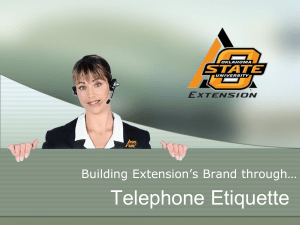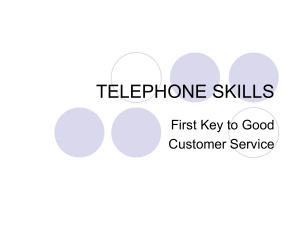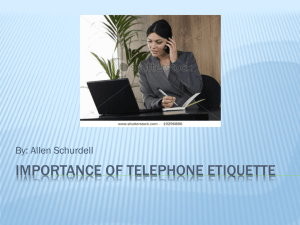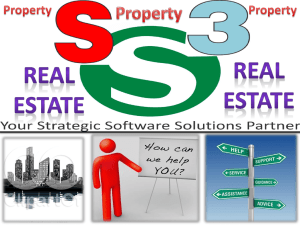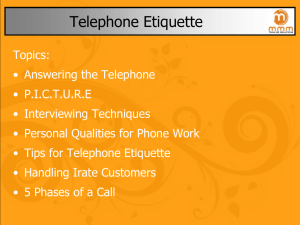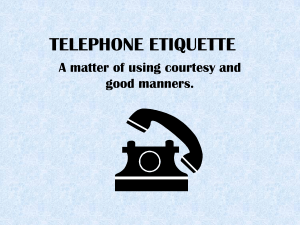Telephone Presentations - National Apartment Association
advertisement
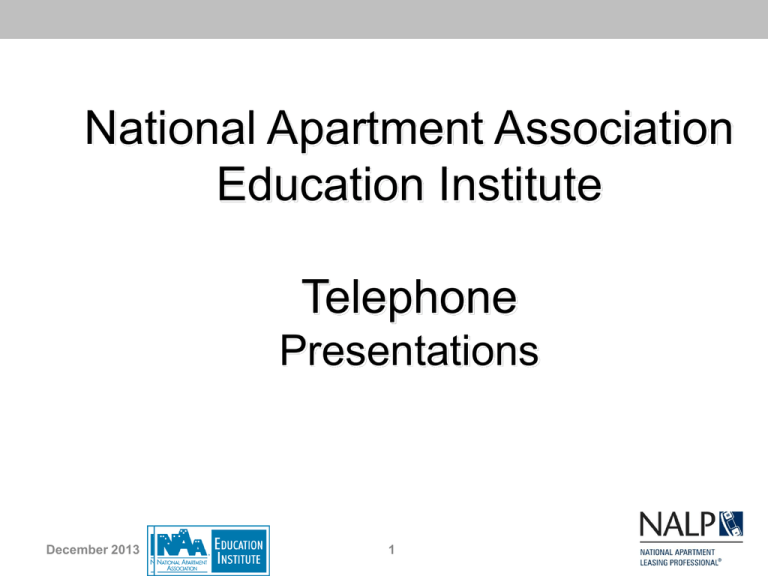
National Apartment Association Education Institute Telephone Presentations December 2013 1 Telephone Presentations Objectives • Implement good telephone etiquette in the workplace. • Apply effective speaking and listening skills to telephone presentations. • List preparations a Leasing Professional should make for a telephone presentation. December 2013 2 Telephone Presentations Objectives • Describe the basic objectives of a telephone contact. • Develop a process for working with current residents. • Handle an irate caller. December 2013 3 Telephone Skills Self-Evaluation • In all telephone conversations: • When speaking to a prospective resident: • When accepting a service request: December 2013 4 Today’s Agenda December 2013 5 Importance of the Telephone • 9 of 10 future residents call first • 4 times more likely to lease December 2013 6 Preparing for a Telephone Presentation 1. Pens and pencils 2. Telephone message pads, blank guest cards 3. A calendar 4. An up-to-date list of apartments available to lease December 2013 7 Preparing for a Telephone Presentation 5. Written directions to the community from North, South, East and West for ease in providing directions 6. Blank service request forms 7. Frequently called numbers 8. A positive attitude December 2013 8 Projecting your Professional Image 1. Smile and be enthusiastic 2. Speak clearly and at an appropriate pace 3. Not place your fingers or hand over the mouthpiece 4. Keep your personal calls to a minimum 5. Be sincere and courteous to your callers December 2013 9 Telephone Etiquette 1. Answer the call promptly 2. Add warmth to your response by smiling when greeting the caller 3. Keep the greeting clean and simple 4. Identify yourself December 2013 10 Telephone Etiquette 5. STOP What you are doing and give the caller your undivided attention 6. Slow down and take control of the conversation 7. Do not carry on additional conversations with others in the office while you are on the telephone 8. Do not handle the call while trying to process paperwork, etc 9. Do not eat, drink or chew gum while on the telephone December 2013 11 Telephone Etiquette 10. Put people on hold only after asking them to hold and waiting for their response 11. Do not leave the caller on hold for longer than thirty seconds 12. Always say “thank you” 13. Wait for the caller to hang up before you hang up the telephone 14. Do not use industry jargon or slang December 2013 12 Improve your Speaking Skills… Improve your Performance. • Communication is a two-way street • Never assume • Think before you speak • Vocabulary • Speaking • Voice Inflection December 2013 13 Voice Inflection 7% Spoken word 93% Non-Verbal Communication “I didn’t tell Tom you were stupid.” December 2013 14 Voice Inflection “I didn’t tell Tom you were stupid.” December 2013 15 Voice Inflection “I didn’t tell Tom you were stupid.” December 2013 16 Voice Inflection “I didn’t tell Tom you were stupid.” December 2013 17 Voice Inflection “I didn’t tell Tom you were stupid.” December 2013 18 Voice Inflection “I didn’t tell Tom you were stupid.” December 2013 19 Voice Inflection “I didn’t tell Tom you were stupid.” December 2013 20 “Empathic Listening” ACTIVITY December 2013 21 Top 10 Ways to Improve Listening 1. Work to understand the other person. 2. Pay attention to the substance of the speaker's requests. 3. Make it a habit to listen first and respond second. 4. Be attentive. 5. Listen carefully for the main idea. December 2013 22 Top 10 Ways to Improve Listening 6. Concentrate on the facts. 7. Ask good questions without overly interrupting the caller. 8. Do not allow positive or negative reactions to the speaker change your behavior. 9. Concentrate all your energy on the speaker. 10. Jot down more detailed notes. December 2013 23 According to Research • Prospects call an average of nine communities December 2013 24 Types of Callers • Time Saving Caller • I Don’t Trust you Caller • Geographical Caller December 2013 25 Basic Objectives • Who? • What? • When? • Where? • Why? • How much? • An appointment? December 2013 26 Keep These in Mind 1. Make sure you guide the conversation 2. As you respond to questions, make sure you ask some of your own 3. Talk about a specific apartment. It is more personable 4. Elaborate on the benefits of this apartment before quoting rental rates 5. Speak positively about the rates. Build value! 6. Always remain pleasant even if you cannot schedule an appointment 7. Leave the prospect with a positive feeling December 2013 27 INITIAL LEASING QUESTIONS • “How much are…” • “Do you have any…” • “Can you tell me about…” December 2013 28 Why Use Q/A/Q? 1. It deflects the price issue momentarily. 2. It places the Leasing Professional in control of the call. 3. It helps qualify the caller by asking when they need their apartment home. 4. It begins the closing process with use of the “Assumptive Close”. December 2013 29 What’s wrong with this Telephone Call? • Leasing Professional • Prospective Resident December 2013 30 Key Elements of a Successful Presentation The leasing presentation begins the moment the telephone is answered. “People buy from people they like.” December 2013 31 3 Key Elements Persuade Inform Enthuse December 2013 32 Closing Begins with the Telephone 1. Establishes a relationship 2. Gathers information 3. Describes the community 4. Looks for opportunities to "close" December 2013 33 Tracking Weekly Traffic December 2013 34 Taking Requests for Service 1. What are the three most frequent requests for services from existing residents at your community? 2. Which requests are easiest to address? • • Which are hardest? Why? 3. Do you notice any difference in your manner when talking with prospective residents than with existing residents? If so, how do you account for it? December 2013 35 Identifying Caller Needs December 2013 36 Identifying Caller Needs Information that should be obtained from the resident generally includes the following: • Resident's name • Pet? • Apartment number • Intrusion alarm code • Telephone number • Specific nature of the problem • The date(incl. year) and time of the call • Specific location of the problem • Permission to enter the apartment December 2013 37 Resolving Problems Follow-up to Ensure the Resident is Satisfied December 2013 38 Handling Irate Callers December 2013 39 The Most Frequent Causes of Irate Calls 1. Previous service request was ignored. 2. Previous service request is still not completed. 3. Increase in rent or decrease in amenities/ resource facilities. 4. Personal problems of the caller unrelated to the service request. 5. Problems with neighbors. December 2013 40 Dealing with Irate Phone Calls from Residents • Remain calm. • Use the caller's name once or twice during the conversation. • Listen to everything the caller says without interruption. • Identify the problems. • Probe for additional information. December 2013 41 Dealing with Irate Phone Calls from Residents • Apologize for any inconvenience, real or imagined. • Keep the voice low. • Reassure the caller that everything possible will be done to solve the problem. • Follow up to make sure the resident is satisfied with the results. • Take thorough notes throughout the conversation. December 2013 42 Fair Housing Implications • Arranging appointments • Availability of properties presented • Making callbacks • Location of properties presented • Acts of courtesy • Follow up procedures • Personal information required December 2013 43 Telephone Presentations December 2013 44
